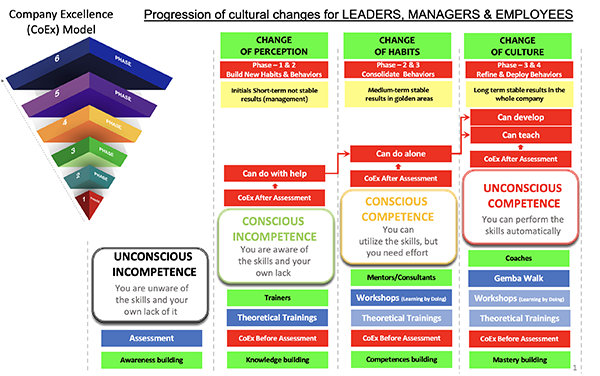Resistance to organizational change is frequently experienced by operations directors when they need to boost a plant's performance and their managers are stuck with an “old” or not up-to-date mindset.
When asked to do more with the same resources, the senior managers and supervisors strongly resist organizational change.
Some operations directors refrain from asking directly to move on; they take time. By doing this, they prevent immediate personal backlash problems but do not go forward with achieving the new required performance goals.
Doing nothing about this situation for an extended period will not positively contribute to the company’s culture and performance.
The results of this non-action will show up slowly in a P&L or balance sheet statement, it will take time, but when it will, bad financial results will start to appear repeatedly and will compound badly.
The Operations Director that wants to overcome resistance to organizational change has 2 choices:
- Change the managers that are showing resistance to organizational change
- Coach the managers toward personal self-change
The first option is sometimes a costly and uncertain solution because, in most cases, it is not only necessary to change a single manager. After the change, his successor has to bring the entire ex-manager team to the next mindset level.
The second option is more respectful of the company's history and less expensive, but it hides the burden of overcoming resistance to organizational change for the entire organization.
What is resistance to organizational change?
In his 1929 work “Self-consistency,” psychologist Prescott Lecky says that every person will always strive to maintain self-consistency.
Lecky's theory affirms that self-consistency is a primary motivating force in human behavior.
The consequent idea is that every manager will always act, speak and behave to preserve his personality self-consistency.
Managers behaviors
Understanding managers' behaviors must begin with their personalities as a central concept.
Every manager conceives himself as a person who is useful to others and capable of making a contribution to the group of people to which he belongs.
A manager who has previously defined himself as “good” would vigorously resist the suggestion that he is now bad or not adequate.
As operations managers experience resistance to organizational change, they must interpret this activity as the struggle of the managers to maintain themself in an environment that becomes unstable for them.
From their point of view, the environment becomes unstable when we ask them to do more with the same amount of resources, and we start to question their management capability.
If they were asked to improve their performance and at the same time we were giving an increasingly proportional number of resources, probably there were no immediate perceived attacks on their personality, but from the moment they are asked to do more with the same, this immediately makes them feel inconsistents and unstables.
How to overcome resistance to organizational change
It is necessary to re-establish self-consistency by attacking the supposed causes of inconsistency and avoiding anti-social instincts that are too primitive and indiscriminate for the company environment.
The technique consists in making the manager aware of his own inconsistency.
It is necessary to enable him to think about his self-consistency, unifying the interpretation of the new data, and thus serve his need for unification and consistency.
The inventory method proposed by Lecky is a valid method of gathering the necessary facts. It is the only method that can force the manager to consider their self-consistency and personality.
Coaching a manager toward personal self-change
 Martin M. Broadwell, in 1969, described "the four levels of teaching" model (see the picture) This model is very useful for monitoring the advancement in a learning path.
Martin M. Broadwell, in 1969, described "the four levels of teaching" model (see the picture) This model is very useful for monitoring the advancement in a learning path.
The model start from the stage of “unconscious incompetence”; this is the stage at which the managers that are showing resistance to organizational change are radicated.
At this stage, they don’t even know they are inadequate.
The inventory method, mentioned by Lecky in his papers and utilized by the psychology school of the time, is the first tool needed to promote self-inquiry in managers; this helps them to become conscious of their incompetence.
If this first stage is successfully passed, the resistance to organizational change will evaporate; the managers will regain self-consistency and definitely open their minds to change. They will finally be ready to start the path of learning new skills, attitudes, and behaviors.
Mario Mason
Kaizen Coach
